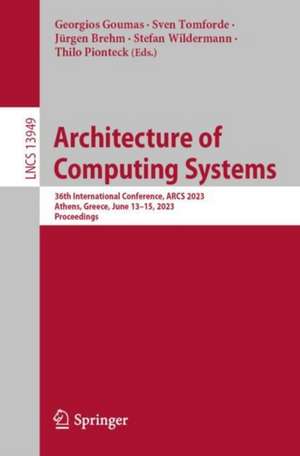Architecture of Computing Systems: 36th International Conference, ARCS 2023, Athens, Greece, June 13–15, 2023, Proceedings: Lecture Notes in Computer Science, cartea 13949
Editat de Georgios Goumas, Sven Tomforde, Jürgen Brehm, Stefan Wildermann, Thilo Piontecken Limba Engleză Paperback – 26 aug 2023
The 18 full papers in this volume were carefully reviewed and selected from 35 submissions.
ARCS provides a platform covering newly emerging and cross-cutting topics, such as autonomous and ubiquitous systems, reconfigurable computing and acceleration, neural networks and artificial intelligence. The selected papers cover a variety of topics from the ARCS core domains, including energy efficiency, applied machine learning, hardware and software system security, reliable and fault-tolerant systems and organic computing.
Back to topARCS provides a platform covering newly emerging and cross-cutting topics, such as autonomous and ubiquitous systems, reconfigurable computing and acceleration, neural networks and artificial intelligence. The selected papers cover a variety of topics from the ARCS core domains, including energy efficiency, applied machine learning, hardware and software system security, reliable and fault-tolerant systems and organic computing.
Din seria Lecture Notes in Computer Science
- 20%
 Preț: 1061.55 lei
Preț: 1061.55 lei - 20%
 Preț: 307.71 lei
Preț: 307.71 lei - 20%
 Preț: 438.69 lei
Preț: 438.69 lei - 20%
 Preț: 645.28 lei
Preț: 645.28 lei -
 Preț: 410.88 lei
Preț: 410.88 lei - 15%
 Preț: 580.46 lei
Preț: 580.46 lei - 17%
 Preț: 427.22 lei
Preț: 427.22 lei - 20%
 Preț: 596.46 lei
Preț: 596.46 lei -
 Preț: 449.57 lei
Preț: 449.57 lei - 20%
 Preț: 353.50 lei
Preț: 353.50 lei - 20%
 Preț: 1414.79 lei
Preț: 1414.79 lei - 20%
 Preț: 309.90 lei
Preț: 309.90 lei - 20%
 Preț: 583.40 lei
Preț: 583.40 lei - 20%
 Preț: 1075.26 lei
Preț: 1075.26 lei - 20%
 Preț: 310.26 lei
Preț: 310.26 lei - 20%
 Preț: 655.02 lei
Preț: 655.02 lei - 20%
 Preț: 580.93 lei
Preț: 580.93 lei - 20%
 Preț: 340.32 lei
Preț: 340.32 lei - 18%
 Preț: 938.83 lei
Preț: 938.83 lei - 20%
 Preț: 591.51 lei
Preț: 591.51 lei - 15%
 Preț: 438.59 lei
Preț: 438.59 lei - 20%
 Preț: 337.00 lei
Preț: 337.00 lei -
 Preț: 389.48 lei
Preț: 389.48 lei - 20%
 Preț: 607.39 lei
Preț: 607.39 lei - 20%
 Preț: 1024.44 lei
Preț: 1024.44 lei - 20%
 Preț: 579.30 lei
Preț: 579.30 lei - 20%
 Preț: 763.23 lei
Preț: 763.23 lei - 20%
 Preț: 453.32 lei
Preț: 453.32 lei - 20%
 Preț: 575.48 lei
Preț: 575.48 lei - 20%
 Preț: 585.88 lei
Preț: 585.88 lei - 20%
 Preț: 825.93 lei
Preț: 825.93 lei - 20%
 Preț: 763.23 lei
Preț: 763.23 lei - 17%
 Preț: 360.19 lei
Preț: 360.19 lei - 20%
 Preț: 1183.14 lei
Preț: 1183.14 lei - 20%
 Preț: 340.32 lei
Preț: 340.32 lei - 20%
 Preț: 504.57 lei
Preț: 504.57 lei - 20%
 Preț: 369.12 lei
Preț: 369.12 lei - 20%
 Preț: 583.40 lei
Preț: 583.40 lei - 20%
 Preț: 343.62 lei
Preț: 343.62 lei - 20%
 Preț: 350.21 lei
Preț: 350.21 lei - 20%
 Preț: 764.89 lei
Preț: 764.89 lei - 20%
 Preț: 583.40 lei
Preț: 583.40 lei - 20%
 Preț: 649.49 lei
Preț: 649.49 lei - 20%
 Preț: 341.95 lei
Preț: 341.95 lei - 20%
 Preț: 238.01 lei
Preț: 238.01 lei - 20%
 Preț: 538.29 lei
Preț: 538.29 lei
Preț: 420.41 lei
Preț vechi: 525.51 lei
-20% Nou
Puncte Express: 631
Preț estimativ în valută:
80.44€ • 84.22$ • 66.56£
80.44€ • 84.22$ • 66.56£
Carte tipărită la comandă
Livrare economică 05-19 aprilie
Preluare comenzi: 021 569.72.76
Specificații
ISBN-13: 9783031427848
ISBN-10: 303142784X
Pagini: 328
Ilustrații: XIX, 328 p. 125 illus., 91 illus. in color.
Dimensiuni: 155 x 235 mm
Greutate: 0.49 kg
Ediția:1st ed. 2023
Editura: Springer Nature Switzerland
Colecția Springer
Seria Lecture Notes in Computer Science
Locul publicării:Cham, Switzerland
ISBN-10: 303142784X
Pagini: 328
Ilustrații: XIX, 328 p. 125 illus., 91 illus. in color.
Dimensiuni: 155 x 235 mm
Greutate: 0.49 kg
Ediția:1st ed. 2023
Editura: Springer Nature Switzerland
Colecția Springer
Seria Lecture Notes in Computer Science
Locul publicării:Cham, Switzerland
Cuprins
Accelerating Neural Networks.- Energy Efficient LSTM Accelerators for Embedded FPGAs through Parameterised Architecture Design.- A Comparative Study of Neural Network Compilers on ARMv8 Architecture.- Organic Computing Methodology (OC).- A Decision-Theoretic Approach for Prioritzing Maintenance Activities in Organic Computing Systems.- Predicting Physical Disturbances in Organic Computing Systems using Automated Machine Learning.- Self-Adaptive Diagnosis and Reconfigurationin ADNA-Based Organic Computing.- Dependability and Fault Tolerance (VERFE) Error Codes in and for Network Steganography.- Modified Cross Parity Codes For Adjacent Double Error Correction.- Computer Architecture Co-Design.- COMPESCE: A Co-design Approach for memory subsystem Performance Analysis in HPC many-cores.- Post-Silicon Customization Using Deep Neural Networks.- Computer Architectures and Operating Systems.- TOSTING: Investigating Total Store Ordering on ARM.- Back to the Core-Memory Age: Running Operating Systems in NVRAM only.- Retrofitting AMD x86 processors with active virtual machine introspection capabilities.- Organic Computing Applications 1 (OC).- Abstract Artificial DNA’s Improved Time Bounds.- Evaluating the Comprehensive Adaptive Chameleon Middleware for Mixed-Critical Cyber-Physical Networks.- CoLeCTs: Cooperative Learning Classifier Tables for Resource Management in MPSoCs.- Hardware Acceleration.- Improved Condition Handling in CGRAs with Complex Loop Support.- FPGA-based Network-attached Accelerators – An Environmental Life Cycle Perspective.- Optimization of OLAP In-memory DB Management Systems with PIM.- Organic Computing Applications 2 (OC).- Real-Time Data Transmission Optimization on 5G Remote-Controlled Units using Deep Reinforcement Learning.- Autonomous ship collision avoidance trained on observational data.- Towards Dependable Unmanned Aerial Vehicle Swarms Using Organic Computing.
